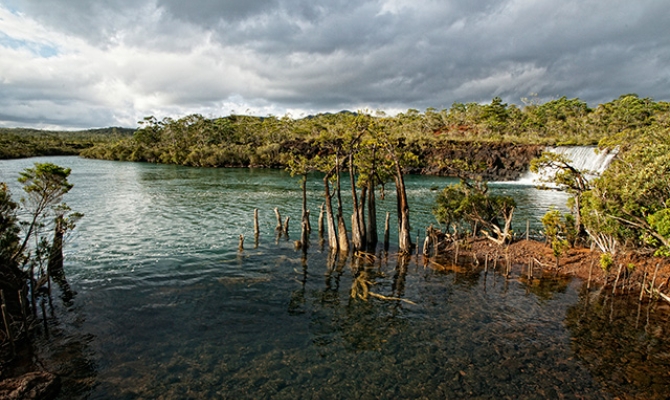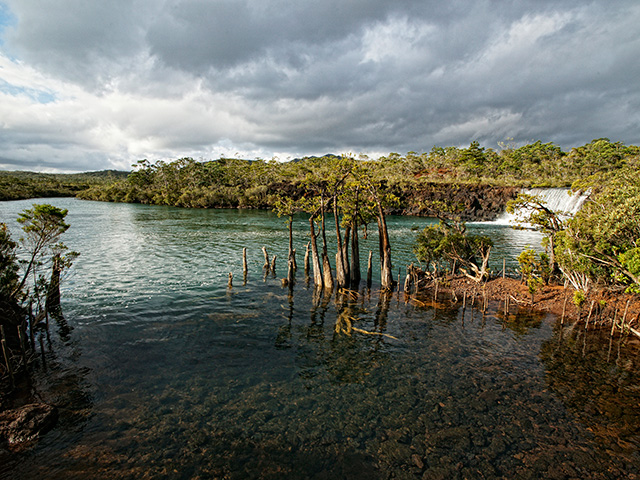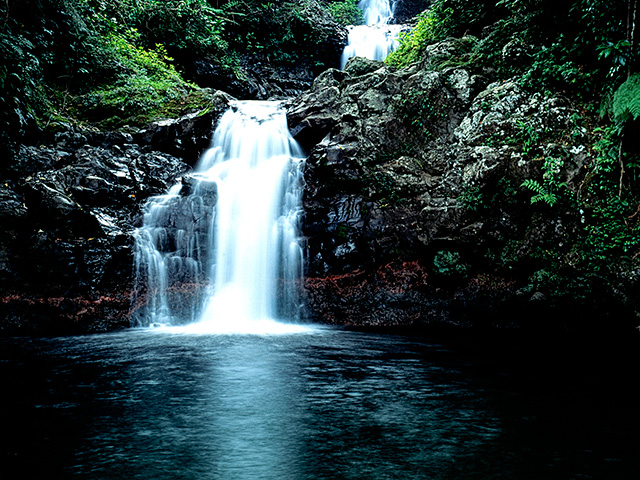
Biodiversity Conservation
Two very important days are observed on 21 and 22 March each year. These are World Forest Day and World Water Day, respectively. In commemoration of both days, the Secretariat of the Pacific Regional Environment Programme (SPREP) turns its focus on two very important natural ecosystems – our wetlands and our forests, both of which are essential to our access to water and in many of our islands, as a source of energy.

Wetlands such as rivers, lakes, water catchments and underground aquifers play an important part in supplying water to our communities in the Pacific. Wetlands are, in fact, the natural infrastructure for managing water as they store and provide the water needed to meet our human consumption and production needs.
Our forests are equally important in this regard. Forests help maintain the water cycle, ensuring that water moves through the natural ecosystem. Roots of trees absorb water from the soil and release water into the atmosphere from their leaves. This is part of the natural water cycle which enables rainfall and thus replenishment of our water catchments. Forests can also provide shade so that water stays in the soil and does not evaporate. Healthy forests also prevent soil erosion and keep rivers and lakes clean.
Both forests and wetlands are also sources of energy – hydrological power relies on ready access to a large supply of water. Under the Pacific Islands Greenhouse Gas Abatement through Renewable Energy Project (PIGGAREP), SPREP is supporting Samoa, Solomon Islands and Vanuatu to assess the possibility of establishing hydrological stations, with Samoa successfully securing funding for five mini-hydrological schemes. Forests continue to provide a source of fuel for many communities and there is also potential in some islands to derive biofuels from plant matter.

SPREP's main focus is on protecting and conserving these natural environments so that they continue to be able to provide their valuable "ecosystem services" for Pacific peoples, but also to allow communities to sustainably utilise these resources and services.
SPREP is working with our Pacific island members to implement the Regional Wetlands Action Plan for the Pacific Islands 2011-2013, which aims to protect and conserve Pacific wetlands. In partnership with the Ramsar Convention on Wetlands, SPREP is assisting Pacific island countries to implement the objectives of the convention. This includes mainstreaming wetlands into national development plans and strategies, identifying and designating national wetlands of conservation value as Wetlands of International Importance and assisting interested non-party Pacific islands to undertake preparations for joining Ramsar.
In Samoa, Lake Lanoto'o, designated a "Wetland of International Importance", is the largest permanent freshwater lake in Samoa. It has a valuable ecological role in maintaining the health of the water supply of the capital city, Apia. The main catchment and sub-catchments of Lake Lanoto'o are tapped to meet the increasing demand for drinking water and for hydro electricity generation.
In Palau, Lake Ngardok, also designated a Wetland of International Importance, is the largest permanent freshwater body in Palau. The lake is particularly important to the small population of Melekeok, State on the island of Babeldoab, for control of floods and maintenance of water quality. Moreover, it is an important source of water supply for Melekeok State and the National Capitol of Palau.
In Fiji, the Upper Navua Conservation Area, designated a Wetland of International Importance, encompasses the upper part of the Navua River and is the third largest freshwater drainage of Fiji. The forest of this area plays a significant role in the ecological health of the entire drainage and provides the necessary supplies and food for the communities in the area. It also provides a wide range of ecosystem services to the entire water catchment area including flood control for lower areas.
The Strategic Plan for the Convention on Biological Diversity (CBD) and its Aichi targets emphasise the need to reduce loss of all habitats, including forests. There are in fact, five Aichi targets that are relevant to the protection and better management of forests.
As the Pacific islands regional focal point for the CBD, SPREP actively works to ensure that all life support systems, including water and forests, are considered as part of each country's National Biodiversity Strategic Action Plan, State of Environment assessment, and Rapid Biodiversity Surveys (BIORAP's) right through to individual site management planning.
SPREP is currently developing an ecosystems services economic analysis in the Vava'u archipelago of Tonga in conjunction with the Deutsche Gesellschaft für Internationale Zusammenarbeit (GIZ) and the International Union for Conservation of Nature (IUCN). This project will be one of the first initiatives in the Pacific to survey communities in order to ascertain what value they, as resource users and owners, place on water.
By better valuing the services that we derive from nature, our island nations will be in a better position to develop sustainable mechanisms to protect our resources while also meeting our development goals.

Image (c) S.Chape/SPREP
Wetlands such as rivers, lakes, water catchments and underground aquifers play an important part in supplying water to our communities in the Pacific. Wetlands are, in fact, the natural infrastructure for managing water as they store and provide the water needed to meet our human consumption and production needs.
Our forests are equally important in this regard. Forests help maintain the water cycle, ensuring that water moves through the natural ecosystem. Roots of trees absorb water from the soil and release water into the atmosphere from their leaves. This is part of the natural water cycle which enables rainfall and thus replenishment of our water catchments. Forests can also provide shade so that water stays in the soil and does not evaporate. Healthy forests also prevent soil erosion and keep rivers and lakes clean.
Both forests and wetlands are also sources of energy – hydrological power relies on ready access to a large supply of water. Under the Pacific Islands Greenhouse Gas Abatement through Renewable Energy Project (PIGGAREP), SPREP is supporting Samoa, Solomon Islands and Vanuatu to assess the possibility of establishing hydrological stations, with Samoa successfully securing funding for five mini-hydrological schemes. Forests continue to provide a source of fuel for many communities and there is also potential in some islands to derive biofuels from plant matter.

Image (c) S.Chape/SPREP
SPREP's main focus is on protecting and conserving these natural environments so that they continue to be able to provide their valuable "ecosystem services" for Pacific peoples, but also to allow communities to sustainably utilise these resources and services.
SPREP is working with our Pacific island members to implement the Regional Wetlands Action Plan for the Pacific Islands 2011-2013, which aims to protect and conserve Pacific wetlands. In partnership with the Ramsar Convention on Wetlands, SPREP is assisting Pacific island countries to implement the objectives of the convention. This includes mainstreaming wetlands into national development plans and strategies, identifying and designating national wetlands of conservation value as Wetlands of International Importance and assisting interested non-party Pacific islands to undertake preparations for joining Ramsar.
In Samoa, Lake Lanoto'o, designated a "Wetland of International Importance", is the largest permanent freshwater lake in Samoa. It has a valuable ecological role in maintaining the health of the water supply of the capital city, Apia. The main catchment and sub-catchments of Lake Lanoto'o are tapped to meet the increasing demand for drinking water and for hydro electricity generation.
In Palau, Lake Ngardok, also designated a Wetland of International Importance, is the largest permanent freshwater body in Palau. The lake is particularly important to the small population of Melekeok, State on the island of Babeldoab, for control of floods and maintenance of water quality. Moreover, it is an important source of water supply for Melekeok State and the National Capitol of Palau.
In Fiji, the Upper Navua Conservation Area, designated a Wetland of International Importance, encompasses the upper part of the Navua River and is the third largest freshwater drainage of Fiji. The forest of this area plays a significant role in the ecological health of the entire drainage and provides the necessary supplies and food for the communities in the area. It also provides a wide range of ecosystem services to the entire water catchment area including flood control for lower areas.
The Strategic Plan for the Convention on Biological Diversity (CBD) and its Aichi targets emphasise the need to reduce loss of all habitats, including forests. There are in fact, five Aichi targets that are relevant to the protection and better management of forests.
As the Pacific islands regional focal point for the CBD, SPREP actively works to ensure that all life support systems, including water and forests, are considered as part of each country's National Biodiversity Strategic Action Plan, State of Environment assessment, and Rapid Biodiversity Surveys (BIORAP's) right through to individual site management planning.
SPREP is currently developing an ecosystems services economic analysis in the Vava'u archipelago of Tonga in conjunction with the Deutsche Gesellschaft für Internationale Zusammenarbeit (GIZ) and the International Union for Conservation of Nature (IUCN). This project will be one of the first initiatives in the Pacific to survey communities in order to ascertain what value they, as resource users and owners, place on water.
By better valuing the services that we derive from nature, our island nations will be in a better position to develop sustainable mechanisms to protect our resources while also meeting our development goals.